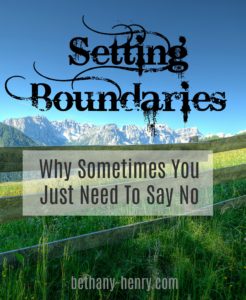There are a lot of good, great, and fabulous things we could be doing and sometimes it’s hard to decide just where to invest our time. We could be playing frisbee! Learning French! Cuddling puppies! Volunteering! Making new friends!
It can be a slippery slope between being engaged and being exhausted.
It’s tricky to know what’s best especially when all the options can look so good.
And it’s hard to know when to say “enough” when it’s tempting to try to do it all.
The “Fear Of Missing Out” has become such a thing these days that it’s become its own word and included in the Oxford Dictionary: FOMO.
We don’t want to miss any of the fun, we’re anxious others may be doing cooler things than we are, and we certainly don’t want to be sitting at home alone doing nothing. So we sign up for everything, triple book every weekend, and rarely darken the doors of our own homes.
Sound familiar?
I feel tired just thinking about it.
Sometimes we don’t even want to be signing up for all of these commitments in the first place. And even if we’re doing things we enjoy, there comes a point when enough is enough. Too much of a good thing is still too much.
And if we’re over extended, over tired, and always busy… where does that leave our eating and sleeping, let alone our writing?
If we’re running ourselves ragged with activities, we aren’t leaving much room for our creativity to flourish.
Being busy is a fact of life at times. But sometimes there are steps we can take to limit our activities and intentionally cultivate a lifestyle that walks a healthier balance between rest and engagement.
This is all about setting boundaries.
Going back to the Oxford Dictionary for a moment, a boundary is defined as a line marking a limit.
We all have different limits.
In fact even our own limits can change at times. Personally, I don’t want to be around many people when I’m tired. (And they probably don’t want to be around me either! 😉 ) My attention and energy levels are lower when I’m tired. This means that when I’m tired I need to step back and do less.
It’s important to recognize where our limits are in order to find our own balance.
There are several reasons why this is important.

1. Setting boundaries is how we value and care for ourselves.
Practicing self care is important and having boundaries is a big part of how to do this. If we don’t set limits for ourselves we are setting ourselves up to struggle.
Being overly busy and neglecting self care eventually leads to burn-out, frustration, and failure. We’re setting ourselves up for exhaustion, leading to sickness and neglect of self. We’re setting ourselves up to be superficial, where we have little time to devote to any one person or issue.
I don’t want to be overworked, exhausted, and superficial.
We may be able to juggle multiple activities a day for a time but in the end it is not sustainable.
Again, everyone will have their own levels of what a healthy balance looks like for them. Some people thrive on having a big event every night, others need a week to recover.
We don’t do anyone any favors by running ourselves into the ground. Instead, it is important to be practicing self care and looking after our own needs.
The fact is, you and your needs are important.
You don’t have to feel guilty over taking time for yourself and saying no to a request does not make you a bad person. Our worth is not measured by how many parties we’ve attended or how many tasks we’ve helped out with.
Ideally we can figure out how much time we need for ourselves to be refreshed and healthy and anything on top of that we can feel free to commit to other activities as we choose. The key is to start off by setting limits to promote our own wellness and self care. Setting these boundaries helps keep us healthy both physically and emotionally.

2. Setting boundaries is how we value and care for others.
Not only are we taking care of ourselves by saying no to activities that will overburden us, but we are also caring for others. We are doing this in two ways.
- Others can learn from our example. We often learn by example. If everyone around us is busy constantly and defining themselves by their day planners, we figure we should be busy too. But if we see out friends practicing self care, taking time for themselves, and feeling free to say no without being buried in guilt, suddenly we figure, “Hey maybe I can do that too.” By setting boundaries we can be that healthy example for others.
- When we are refreshed we are better able to care for others. We are better friends when we are not stretched between seventeen activities and too busy to sit down to chat. We are better siblings and spouses when we have the time to be flexible when something comes up at the last minute. We can care for the people around us better when we aren’t drowning in stress.
3. Setting boundaries is how we value and care for our writing.
And finally, when we have a healthy life balance we are able to really invest in our writing.
We can write even when we’re busy, and we definitely should! But if we’re busy, stressed, and tired, our writing will suffer (if it’s even happening at all). If we’re stressed and mentally exhausted by other life events, it can be hard to have much brain power left over to give to our writing.
By setting boundaries and reducing other activities we can increase our creative capacity.
By setting boundaries to create specific writing times or simply by limiting other activities, we are committing to our writing.
When we make a place for our writing it gives us a chance to focus.
When we are caring for ourselves we will have the energy to dig deeper into our writing projects and work further toward our goals.
Yay for setting boundaries! These all sound like pretty good outcomes to me 😉

Now I know that saying “no” isn’t always easy.
Most of us have a hard time saying no to people and to activities. I know I do! I’m definitely a people pleaser by nature.
And yet setting boundaries is so important. So how do we do this?
Fortunately, saying “no” gets easier the more we do it.
Like any activity, we can practice and get better at setting boundaries.
To start off it can help to take a few moments and evaluate where you’re at, how you spend your time, and what you’d like your life to look like. Do you already have a decent balance of activities and rest in place? Or does something need to change?
Once you’ve identified what you may want to change (if anything) you can decide what steps are needed to move toward your ideal life balance. It could be as simple as declining an event, limiting social commitments, or asking for help with a project. Maybe you need to mark off some “me time” on the calendar or say “I’m sorry but I can’t” the next time you’re asked to do something you really don’t want to do.
There are techniques and tips available to help which is just a further reminder that we aren’t alone in this. Maybe it will help to practice saying no in front of a mirror. Maybe start by setting boundaries over email or a place that’s less intimidating than face to face.
Personally I find it helpful simply to have reminders that I should be taking care of myself and validation that I’m not being unreasonably selfish to practice self care by setting boundaries.
We all have different things we struggle to limit in our lives. Whether it’s an activity, a person, or an event that is stressful, let’s give ourselves permission to step back and protect ourselves by setting boundaries. Get a friend to help as needed!
It may take a while before we feel comfortable saying no even when we recognize the need to. But we can be working toward that goal and practicing moving ourselves toward a healthy life balance. Let’s take care of ourselves and make wellness a priority 🙂
What about you? Are there things you struggle to say no to? What are ways you’ve found to set good boundaries in your life?





